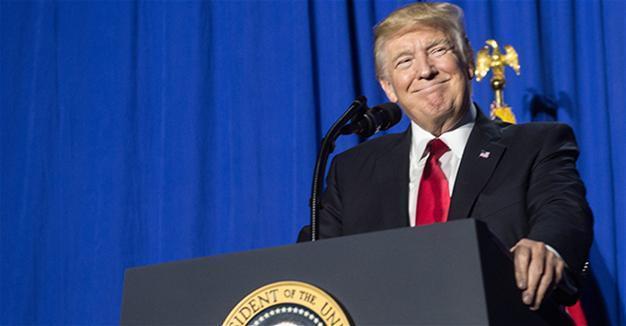Turkey awaits results of US study on safe zones in Syria
Sevil Erkuş - ANKARA

AFP photo
Turkey has always supported the idea of safe zones in Syria but would need to review any U.S. plans before commenting on a draft executive order that is expected to be signed by U.S. President Donald Trump regarding safe zones in Syria, Ankara has said.“We have seen the U.S. president’s request to conduct a study. What’s important is the results of this study and what kind of recommendation will come out,” Müftüoğlu told reporters at a press briefing in Ankara on Jan. 26.
His comments came after Trump pledged to order safe zones in Syria. “I will absolutely do safe zones in Syria for the people,” Trump said Jan. 25.
The U.S. president was set to order the Pentagon and State Department to act in accordance to the implementation of safe zones in Syria, Reuters reported.
“The Secretary of State, in conjunction with the Secretary of Defense, is directed within 90 days of the date of this order to produce a plan to provide safe areas in Syria and in the surrounding region in which Syrian nationals displaced from their homeland can await firm settlement, such as repatriation or potential third-country resettlement,” the draft order said seen by Reuters.
The Kremlin said on Jan. 26 that Trump’s administration should consider the implications of establishing a safe zone in Syria, adding that the U.S. had not consulted Russia before the declaration.
“No, our American partners did not consult with us. It’s a sovereign decision,” Kremlin spokesman Dmitry Peskov said in a conference call with reporters. “It is important that this [the plan] does not exacerbate the situation with refugees, but probably all the consequences ought to be weighed up.”
“Setting up of safe zones is something Turkey has advocated from the very beginning. The best example is in Jarablus,” Müftüoğlu said, citing the northern Syrian region where thousands of Syrians have returned after Turkish-backed opposition forces drove out the Islamic State of Iraq and the Levant (ISIL).
After supporting the Free Syrian Army (FSA) fighting against Syrian President Bashar al-Assad, Turkey has trained and equipped a new Syrian police force that has started to work in Jarablus, a border town freed from ISIL by FSA, on Jan. 24.
Turkey’s Operation Euphrates Shield, which was launched in August 2016 against ISIL, has gained control over 100 kilometers territory from the border, producing what Turkish officials have been referring to as a “de facto safe zone.”
Asked about attacks by the Jabhat Fateh al-Sham group, formerly known as the al-Nusra front, on the FSA, Müftüoğlu said some elements in Syria may be frustrated by progress made at peace talks backed by Turkey, Russia and Iran in Astana.
Meanwhile, Syrian Islamist rebel group Ahrar al-Sham said on Jan. 26 that six other rebel factions, al-Wiyat Suqour al-Sham; Fastaqim; Jaish al-Islam’s Idlib branch, Jaish al-Mujahideen; al-Jabha al-Shamiya’s west Aleppo branch, as well as the Sham Revolutionary Brigades had joined its ranks in northwestern Syria in order to fend off a major assault by the Jabhat Fateh al-Sham, according to Reuters.
A three-way mechanism between Turkey, Russia and Iran to enforce a cease-fire in Syria is still being worked on after talks between the warring parties, and Turkey will not permit “spoilers” to overshadow the efforts that are being undertaken, he noted.
“It is incumbent on guarantor countries to prevent that from happening,” Muftüoğlu said.
He also answered questions as to whether Turkey had changed its opposition to al-Assad, saying, “The Syrian leader has no place in the country’s future.”
















